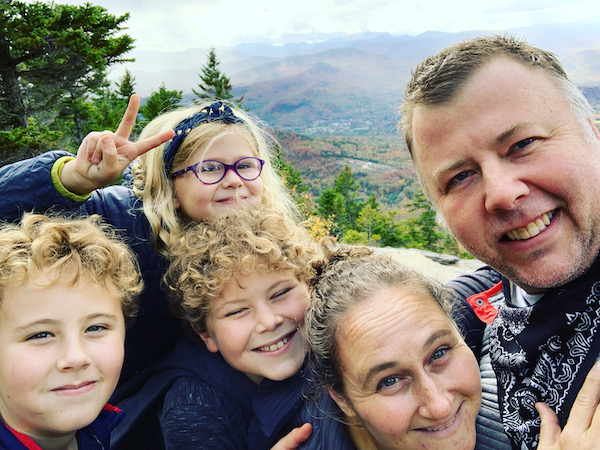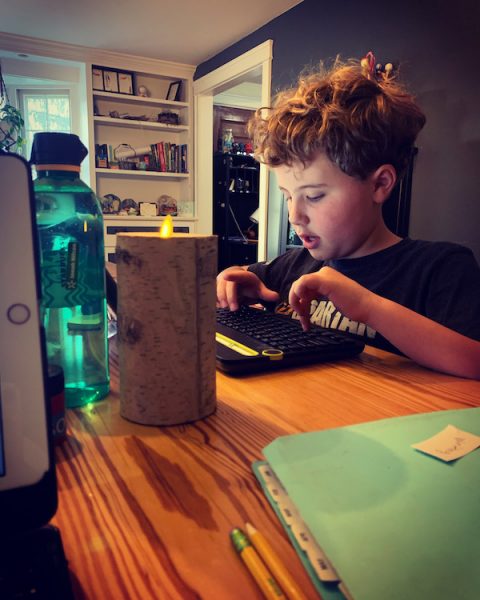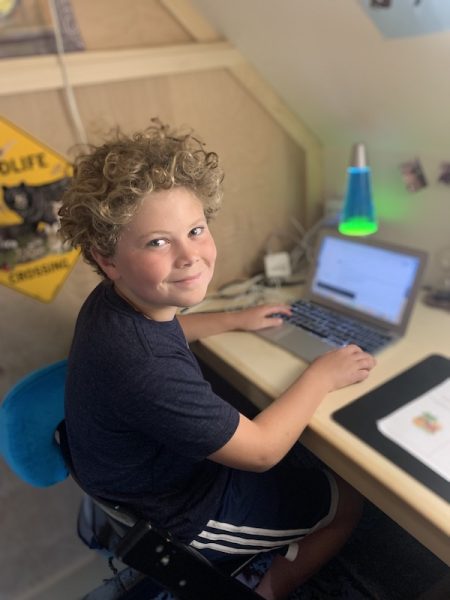When Rachel Gitelson counsels people who are having a hard time parenting during the pandemic she speaks not only as a professional therapist but also as a parent. She and her husband Doug Nilson have three children — ages 7, 9, and almost 12.
Her two most often spoken and used pieces of advice are:
- Manage your expectations.
- Show yourself some compassion.
She says the biggest challenge she and other parents are facing is trying to juggle everything. A lot of the issues she hears about came up pre-pandemic, but like many things, they’re all exacerbated right now. Right over the top for some parents. And what complicates matters more is that there are many layers to the issues that go beyond parenting.
Parenting, plus
Let’s say you and your partner have full-time jobs and you’re both working from home. You may have to jockey for time and space. And all that togetherness can a bit too much. If you think you could use some couple’s therapy, check out my blog post with Rachel’s colleague Kathleen Kane — Love and relationships in the time of COVID.
You might also be worried about your own parents who may be in a high-risk category. The grandparents to your children, who haven’t been able to give any hugs or an extra hand with the grandkids for the past year. Rachel’s parents are close enough to visit but at a distance.
My parents live in York and we see them about every other week in our backyard all masked and distanced for brief periods of time. Just so they can get to see us, but we’re not spending any real time together.
Rachel Gitelson, LCSW, Director of Clinical Supervision, WellSpace
Overwhelmed parent
Even without those side issues, many parents are feeling overwhelmed by their kids’ needs (including schoolwork) while they are trying to work (if they still have a job) and trying to manage the household (or feeling guilty because they aren’t).
Parents are having a lot of worry and anxiety that they’re not doing it right, that they are somehow doing something detrimental to their children. There is no way to avoid the stress, so we have to find ways to manage it.
Rachel
First of all, says Rachel, acknowledge the stress and worry and anxiety that you may be feeling. Lean right into it and have a pity party. Feel sorry for yourself, and then take a deep breath and lean back out and look at the big picture. Take stock of what you have in your life that is good. What you have that makes you feel grateful.
I don’t want clients to ever feel like they’re not allowed to feel awful or to think this is horrible. I just want them to feel it, breathe, and then try to find the good amongst the chaos because there’s always something you can find.
Rachel
Self-compassion
Experiencing gratitude may help you cope but what if you’re are physically and mentally exhausted? How how do you take care of yourself when you’re feeling overwhelmed? Part of the answer is trying to manage your expectations about self-care, mindfully choosing little things you can do for yourself, and practicing some self-compassion.
Self-compassion is knowing that what I’d really like to do today is go out for lunch with a friend, and go to the grocery store by myself and take a run. That’s not practical right now, but what can I do? Can I ask my partner to take the kids for 45 minutes and go for a walk or have a cup of tea? It’s this balance of acknowledging that it’s not enough and leaving space to mourn that loss, but then stepping back out again and seeing what you can find for yourself.
Rachel
Guilt, expectations, flexibility
Some parents are feeling guilty because they swore they’d never plunk the kids down to watch a video or television show and here they are, doing just that so they can have a few moments to themselves. You might need to manage your expectations about those things for the time being, too, and be more flexible.
Managing expectations and being flexible might also be necessary when it comes to kids being online. They may need to be for school, but in isolation, they’re also using their devices to connect with friends, play games, or watch videos. Some families who restricted their children’s use of devices before have allowed them more access, and in other families, children are basically online all day. Rachel and her husband allow their children screen time but also look for safe ways for them to interact with friends.
My fourth grader has virtual playdates with a buddy on FaceTime and they chat and play with Legos together. Recently when my sixth-grader was done with his schoolwork, I encouraged him to put on a mask, get on his bike and ride over to a friend’s house and take a bike ride, and they did. They were outside and they were masked. He came back and he was lit up and high as a kite because he had that interaction. I know it takes time and energy, which we all are struggling to find, but I think you can find ways for your kids to have some of those interactions safely.
Rachel
Rachel’s children are in school and are all doing hybrid learning right now. Part of the week, they’re in the classroom, and part of the week they’re learning from home. Some kids are perfectly fine doing schoolwork at the computer and others miss the social interaction they get at school. She says it’s important to take stock of and understand what your child’s personality needs, and to be on the lookout for changes.
If you’ve got a kid who doesn’t love school and isn’t loving school this way, that’s not a big change, but it is if you’ve got a kid who used to love school or used to really engage with friends and is now showing no interest. I think it’s those big changes in their personality where it’s more than, oh, this is really hard.
Rachel
Children may be incredibly resilient, far more than some adults, but it’s important to honor that they are probably feeling a lot of disappointment and anxiety, too. You can have conversations about that but parents are also teaching their children how to manage frustration and disappointment by the way they do.
Apologies from a parent
And what about those moments when the behavior you are modeling for your children isn’t teaching them the lessons you intended? When you lose your temper, yell at them, burst into tears, have your own temper tantrum? Maybe it can be a teachable moment for everyone.
There are going to be ruptures in the relationship, even without a pandemic. You know, your kid breaks something and it was an accident, but you’re really frustrated and maybe you overreact to it. Research shows that kids don’t remember the rupture, they remember the repair. You can go back again, and you say to your child, I was really upset that you broke that thing, and we’re gonna have to figure out how to fix it or get a new one. But you also say I shouldn’t have yelled at you like that. It probably didn’t feel very good. I love you, I’m sorry, I can do better, and give them a hug. The kids remember the repair more than they remember the rupture, and then in turn, you’re teaching them how to deal with life, because life is hard.
Rachel
Cutting back
Rachel is a licensed therapist and Director of Clinical Supervision at WellSpace Counseling Center in Portland and Yarmouth, Maine. She specializes in the treatment of individuals, families, couples, and parental support. For this past year, she has been working from home and seeing clients online, but she has had to cut back on the number of clients she sees because she simply doesn’t have the time.
Her children may actually go to school a few days a week, but the rest of the time they are learning from home, and her two youngest need her supervision and help with their schoolwork. She had the flexibility to make the choice to cut back; her husband, who is an emergency room doctor, didn’t. She said she read that in September alone, more than 800,000 women had left the workplace, mostly in order to take care of their children.
That’s something that I think is really important for parents to hear, just to highlight how hard this is, and how it’s affecting people. Cutting back has been a real loss to me and to my clients, obviously, and I certainly was not meant to homeschool my children. I don’t enjoy it at all, but I recognize how hard it is and how much I dislike it. I also accept that I have no choice. It’s just the way it is.
Rachel
Divisions of labor
Whatever their individual circumstances, parents have had to juggle their schedules, come up with different routines, and maybe have a new conversation about the division of labor at home. Rachel often talks with couples about setting up chunks of work time that they can alternate between them.
It may require getting up earlier in the day than you typically would and working further into the evening but you could do two or three-hour chunks, where the two partners are taking turns, focusing on work versus focusing on the kids. That is for many families more successful than everybody trying to work and manage the kids at the same time.
Rachel
Rachel says it’s not lost on her that she and her family are fortunate. While it may be hard, her kids’ needs are being met and for that, she is extremely grateful. It’s not the case for some parents.
I have a lot of clients who’ve got children at home with special needs. If you’ve got a child with special needs, sometimes those special needs include having an aid to help them, which in many cases, can no longer happen because of the pandemic.
Rachel
You’ve got this, parent
There are myriad other reasons why it may be more difficult for some parents than others, but in general, there’s no away around it. Parenting is is always a challenge, but parenting during a pandemic is just plain hard. Remember Rachel’s first pieces of advice:
- Manage your expectations.
- Show yourself some compassion.





Leave A Comment